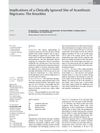December 2022 in “Scientific Reports” Compound 4 is a promising treatment for hair loss with low toxicity.
 11 citations,
April 2013 in “SpringerPlus”
11 citations,
April 2013 in “SpringerPlus” Human skin's melanocytes respond to light by changing shape, producing pigments and hormones, which may affect sleep patterns.
 9 citations,
October 2014 in “Experimental and Clinical Endocrinology & Diabetes”
9 citations,
October 2014 in “Experimental and Clinical Endocrinology & Diabetes” Knuckle Acanthosis Nigricans is common in Latin American youth and may indicate early insulin resistance, especially in those with normal weight.
 May 2020 in “Fertility and Sterility”
May 2020 in “Fertility and Sterility” Nonobese, normotensive Indian women with PCOS may have a higher risk of heart problems linked to inflammation and insulin resistance.
 2 citations,
January 2011 in “Elsevier eBooks”
2 citations,
January 2011 in “Elsevier eBooks” Early treatment of acne is crucial to prevent scarring and psychological effects.
180 citations,
October 2019 in “British journal of haematology” Early detection and treatment of iron deficiency in pregnancy are crucial for maternal and infant health.
 72 citations,
October 2010 in “Journal of The American Academy of Dermatology”
72 citations,
October 2010 in “Journal of The American Academy of Dermatology” Iron deficiency common in women, not always linked to hair loss; more research needed.
 40 citations,
January 2013 in “Journal of Korean Medical Science”
40 citations,
January 2013 in “Journal of Korean Medical Science” Iron deficiency may contribute to hair loss.
 34 citations,
July 1999 in “Journal of The European Academy of Dermatology and Venereology”
34 citations,
July 1999 in “Journal of The European Academy of Dermatology and Venereology” Iron deficiency is not a significant cause of hair loss in women.
 30 citations,
October 2010 in “Journal of The American Academy of Dermatology”
30 citations,
October 2010 in “Journal of The American Academy of Dermatology” The conclusion suggests a possible link between iron levels and hair health in women, recommending further research on iron supplementation for hair loss.
 28 citations,
October 2007 in “PubMed”
28 citations,
October 2007 in “PubMed” Low iron levels are linked to more hair loss in non-menopausal women.
 22 citations,
November 2008 in “International Journal of Dermatology”
22 citations,
November 2008 in “International Journal of Dermatology” A mix of 5-aminolevulinic acid and iron ion can speed up hair growth.
 22 citations,
April 2006 in “Journal of The American Academy of Dermatology”
22 citations,
April 2006 in “Journal of The American Academy of Dermatology” More research is needed to determine if iron deficiency causes hair loss.
21 citations,
January 2009 in “Indian journal of dermatology, venereology, and leprology” Vitamin B12, folate, ferritin, and iron levels are not linked to alopecia areata.
15 citations,
January 2018 in “Indian Journal of Dermatology” Women with androgenetic alopecia have lower zinc and iron levels.
 15 citations,
January 2010 in “Experimental Dermatology”
15 citations,
January 2010 in “Experimental Dermatology” Hair loss in certain young mice is linked to a specific gene and can be caused by lack of iron.
 13 citations,
January 2015 in “International Journal of Trichology”
13 citations,
January 2015 in “International Journal of Trichology” Higher lead and cadmium, and lower zinc and iron levels in the blood might be linked to chronic hair loss in women.
 12 citations,
July 2020 in “International Journal of Pharmaceutics”
12 citations,
July 2020 in “International Journal of Pharmaceutics” Iron oxide nanoparticles improve skin penetration and drug release for hair loss treatment.
12 citations,
January 2016 in “Journal of clinical biochemistry and nutrition” Deferasirox combined with sorafenib reduces liver cancer risk and lessens treatment side effects.
 11 citations,
September 2020 in “Journal of Cosmetic Dermatology”
11 citations,
September 2020 in “Journal of Cosmetic Dermatology” Silver nanoparticles can significantly promote hair growth.
 9 citations,
February 2019 in “BMC cancer”
9 citations,
February 2019 in “BMC cancer” M30 is a promising treatment for preventing hair loss during chemotherapy.
 8 citations,
February 2007 in “Journal of The American Academy of Dermatology”
8 citations,
February 2007 in “Journal of The American Academy of Dermatology” Higher serum ferritin levels than currently used might be needed to rule out iron deficiency in women with hair loss.
 6 citations,
June 2011 in “Journal of The American Academy of Dermatology”
6 citations,
June 2011 in “Journal of The American Academy of Dermatology” Iron deficiency might be linked to hair loss, but more research is needed.
 5 citations,
August 2003 in “British Journal of Dermatology”
5 citations,
August 2003 in “British Journal of Dermatology” Iron deficiency might contribute to hair loss in women.
4 citations,
January 2005 Low iron levels are linked to hair loss in adult women.
 3 citations,
February 2005 in “Journal of Quantitative Spectroscopy & Radiative Transfer/Journal of quantitative spectroscopy & radiative transfer”
3 citations,
February 2005 in “Journal of Quantitative Spectroscopy & Radiative Transfer/Journal of quantitative spectroscopy & radiative transfer” Iron and zinc levels in hair are not linked to hair loss from chemotherapy.
 2 citations,
December 2015 in “Journal of dermatology research and therapy”
2 citations,
December 2015 in “Journal of dermatology research and therapy” People with Chronic Telogen Effluvium mainly have lower iron levels compared to healthy individuals.
1 citations,
April 2021 in “Nepal journal of dermatology, venereology & leprology” Iron profile tests are recommended for women with hair loss, as haemoglobin levels alone are not reliable.
 1 citations,
January 2021 in “Journal of biological chemistry/The Journal of biological chemistry”
1 citations,
January 2021 in “Journal of biological chemistry/The Journal of biological chemistry” FLCN helps control iron levels in cells.
 1 citations,
June 2011 in “Journal of The American Academy of Dermatology”
1 citations,
June 2011 in “Journal of The American Academy of Dermatology” Iron deficiency is common in women regardless of hair loss, and treating it does not usually reverse hair loss.






















